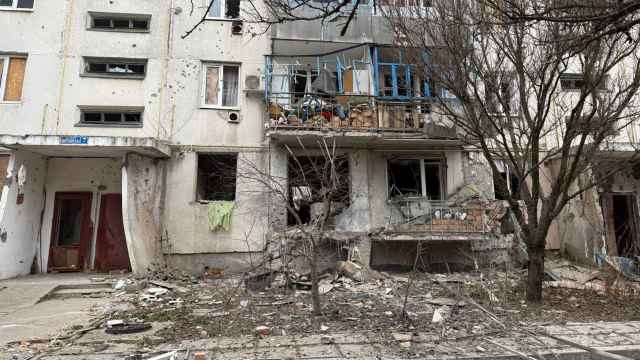ST. PETERSBURG — Russia will fully meet its domestic borrowing plans this year, Finance Minister Alexei Kudrin said Tuesday, contradicting expectations that high oil prices will reduce the need for debt issuance.
"I do not doubt that we will need to meet the borrowing plan in full," he told reporters on the sidelines of a conference in St. Petersburg.
Russia is stepping up borrowing as it seeks to plug a post-recession deficit and invigorate the domestic market, making it easier for companies to attract funds, too.
The 2010 budget features new domestic borrowing of 1.21 trillion rubles ($39.76 billion) this year. But Kudrin's deputy Tatyana Nesterenko said this had already been reduced to 1.07 trillion rubles, according to documents currently submitted to the State Duma for approval.
By the end of September, 508 billion rubles of treasury bonds had been placed, according to Finance Ministry data.
A further 300 billion rubles of OFZ treasury bonds will be offered at auctions during the current quarter. Moscow has also said a planned $3 billion issue of ruble-denominated eurobonds, potentially due before the end of this year, would be included as part of the domestic borrowing plans.
Based on the latest budget revisions, that would potentially still leave Russia nearly 200 billion rubles short of meeting this year's plan — but officials have previously suggested that less cash may in fact be needed thanks to strong revenues from high oil prices and relatively restrained spending to date.
Kudrin, known for his fiscal prudence, downplayed such expectations. "This year we do not currently plan to reduce the [borrowing] program from the announced levels, because by the end of the year there will be [more] spending," he said.
"The deficit will be much higher than some experts are forecasting," he added.
In the first nine months of this year, Russia ran a deficit of 728 billion rubles against the 2.43 trillion rubles, or 5.4 percent of gross domestic product, planned for 2010 as a whole. Revenues reached 77 percent of the full-year amount while spending covered just 66 percent of the full-year target.
This has led to expectations that the full-year deficit will come in lower than planned. The Central Bank's First Deputy Chairman Alexei Ulyukayev said last week that the gap could be 3.5 percent of GDP.
But Nesterenko gave a much more conservative forecast.
"We expect a deficit of 5.3 percent or 2.381 trillion rubles," she told reporters in Moscow, adding that this was the figure currently before the Duma.
On Monday, Prime Minister Vladimir Putin said, however, that the budget deficit this year is likely to be significantly lower.
Nesterenko said that of the 135.7 billion ruble reduction in the borrowing plan, 44 billion rubles was due to extra revenues and the rest due to exchange rate fluctuations.
On Wednesday, the Finance Ministry will put up for auction 9.5 billion rubles in 2014 OFZ at 6.61 to 6.71 percent and 15.5 billion rubles in paper maturing in February 2011 at 7.10 to 7.15 percent — potentially offering a small premium to current market levels.
A Message from The Moscow Times:
Dear readers,
We are facing unprecedented challenges. Russia's Prosecutor General's Office has designated The Moscow Times as an "undesirable" organization, criminalizing our work and putting our staff at risk of prosecution. This follows our earlier unjust labeling as a "foreign agent."
These actions are direct attempts to silence independent journalism in Russia. The authorities claim our work "discredits the decisions of the Russian leadership." We see things differently: we strive to provide accurate, unbiased reporting on Russia.
We, the journalists of The Moscow Times, refuse to be silenced. But to continue our work, we need your help.
Your support, no matter how small, makes a world of difference. If you can, please support us monthly starting from just $2. It's quick to set up, and every contribution makes a significant impact.
By supporting The Moscow Times, you're defending open, independent journalism in the face of repression. Thank you for standing with us.
Remind me later.





